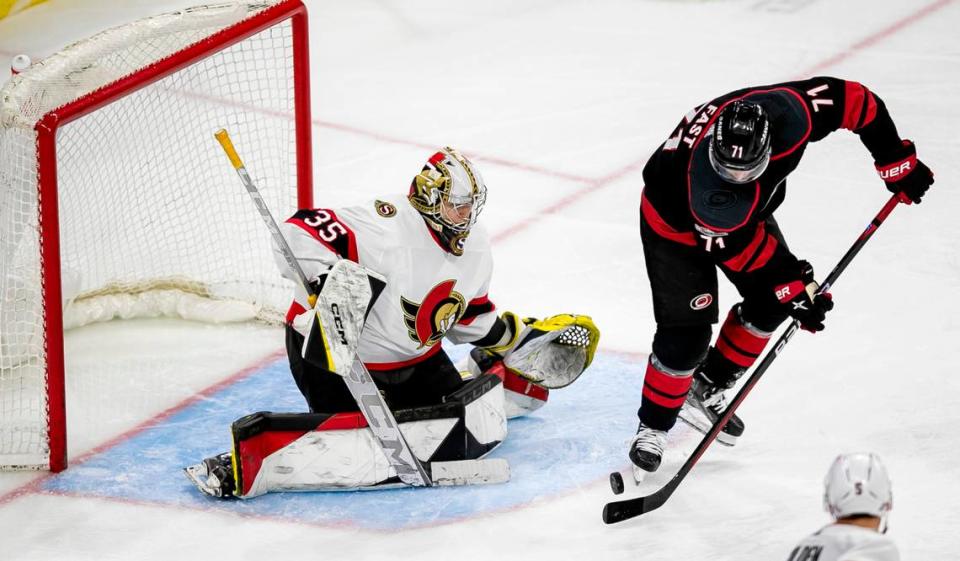Hurricanes lone language speakers find a home, even on their little linguistic islands
- Oops!Something went wrong.Please try again later.
- Oops!Something went wrong.Please try again later.
- Oops!Something went wrong.Please try again later.
- Oops!Something went wrong.Please try again later.
- Oops!Something went wrong.Please try again later.
- Oops!Something went wrong.Please try again later.
Frederik Andersen is used to it, to the point where it takes him a second to get his idioms switched from English back to Danish when he goes back home. He’s spent his entire NHL career surrounded by all kinds of languages — English, mostly, but also French and Czech and Russian and German and Swedish, and now, especially, Finnish — but never his own.
That might be nice, someday, to share a locker room with someone who shares his native tongue, gets all the idioms and inside jokes, a little piece of home so far away. But he also knows, given the number of Danes in the NHL, it’s not likely.
“The odds are against,” Andersen said.

Martin Necas and Jesper Fast share his predicament in the Carolina Hurricanes’ locker room, living on linguistic islands. But there are a ton of Czechs and Swedes in the NHL, and have been here over the years — Necas even had a countryman this season, when the injured Ondrej Kase was around. Their situation is relatively unusual by hockey standards.
Andersen’s is not. He long ago became used to the idea that he would be the only Dane in the room, from the moment he first came to North America, and equally long ago figured out how to live his life exclusively in English.
“I have thought that it would be fun to try to play with a Danish guy,” Andersen said. “Obviously, we all know each other from national teams and stuff. But it’s not a huge priority, obviously. For me, I feel so integrated here and so much at home pretty much everywhere I go — and that’s partly the people who are in this organization, for example, or previous ones — that I just feel at home and feel really comfortable, and that makes it easier being so far away from home.”
Fast spent his career with the New York Rangers surrounded by Swedes the way Carolina’s Finns are surrounded by Finns now, including the magnificent Henrik Lundqvist, a fashion icon in any language, so bilingual he speaks better English than some of his counterparts on the TNT set.

But he was a 23-year-old newcomer to North America then. When he left to sign with the Hurricanes in the fall of 2020, Fast had been here long enough that there wasn’t any culture shock as his new team’s token Swede. He admits, though, there’s occasionally a night on the road where it might be nice.
“It helped,” Fast said. “Every time you came to the rink, you were talking Swedish, on the road, at dinners and stuff. Here you speak English the whole time. When I’m on the road, there’s no one.”
At home, Fast’s young children are being raised bilingually; his 2-year-old, the oldest, speaks English at preschool and Swedish at home, so it’s not like he’s entirely isolated the way Necas and Andersen are among the Hurricanes. If anything, it’s less the absence of Swedish teammates that bothers him than having to listen to the Hurricanes’ five Finns blather away in a language that sounds nothing like its Nordic neighbors.
“Their language is so ugly,” Fast joked. “We could possibly understand what people in the region are saying, because we kind of have a similar language, but the Finns are so off, it’s like we have no clue what they’re saying. Talking so quick, too.”
But they do have each other, from “Father Finn” Antti Raanta down to newcomer Jesse Puljujarvi, a Swedish-born Finn whose trade-deadline arrival with the Hurricanes was cushioned by the number of fellow native speakers in the room to extend a hearty tervetuloa. Andrei Svechnikov speaks English well enough to translate for Pyotr Kochetkov (who pretends not to speak it as well as he does), but he doesn’t have to go a day without hearing a familiar privyet. The others aren’t so fortunate.
Necas, at least, had Kase for part of this season, and Petr Mrazek upon his arrival in the NHL, when he really needed him. His English has improved by leaps and bounds, his command of the language underlined by the joke he made about Hurricanes fans bailing out before the team came back from two goals down in the final two minutes in January: “It’s like a movie. Don’t leave early.”
It wasn’t like that when Necas was a gangly teen navigating life not only in the NHL but life at Harris Teeter and Chipotle and the gas station. Having Mrazek around made Necas’ transition to life here far easier than it would have been otherwise, but Necas no longer needs a Czech speaker around the way he once did. He’s fine going it alone, although there’s a part of him that wouldn’t mind having one on his line.
“I never got the experience to play on a line with somebody who speaks Czech and speak about the game that way,” Necas said. “I would like it maybe, in the future, to get some Czech players here. I don’t miss it, but it’s nice when someone’s here.”
That’s probably never going to be a luxury Andersen has, and he long ago made the transition to living his life in English, and only English, so long ago that his brain is basically bifurcated between the two languages.
English, here.
Danish, at home.
“It is interesting,” Andersen said. “I feel like everyday life, I’m just in English mode. It’s like a switch you have to flip. I have to brush the rust off and get used to it again. There’s a lot of words in Denmark that are the same. A computer would be a computer, basically. There’s words that are literally English words. But there’s a lot of sayings that don’t work.”
In the end, English remains the lingua franca of the Hurricanes’ dressing room, despite the growing Finnfluence, and all three of the linguistic lonelyhearts are now fluent in their second language. If there are any pangs of homesickness, they have been thwarted by the home they have found here.
“It’s kind of been good for me personally,” Fast said. “Sometimes, with one or two other Swedes you get attached to each other. It’s been kind of good for me to be able to speak English and be able to — I mean this group, ever since I got here, has so much togetherness and a family feeling. It’s good to be the only Swede and just be me as a person.”
Never miss a Luke DeCock column. Sign up at tinyurl.com/lukeslatest to have them delivered directly to your email inbox as soon as they post.
Luke DeCock’s Latest: Never miss a column on the Canes, ACC or other Triangle sports

